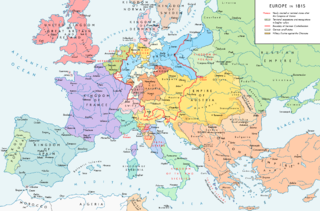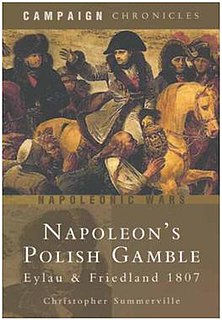Related Research Articles

The Second Polish Republic, commonly known as Interwar Poland, refers to the country of Poland in the period between the two World Wars (1918–1939). Officially known as the Republic of Poland, the Polish state was re-established in 1918, in the aftermath of World War I. The Second Republic ceased to exist in 1939, when Poland was invaded by Nazi Germany, the Soviet Union and the Slovak Republic, marking the beginning of the European theatre of World War II.

The Congress of Vienna of 1814–1815 was an international diplomatic conference to reconstitute the European political order after the downfall of the French Emperor Napoleon I. It was a meeting of ambassadors of European states chaired by Austrian statesman Klemens von Metternich, and held in Vienna from November 1814 to June 1815.

The Locarno Treaties were seven agreements negotiated at Locarno, Switzerland, during 5 to 16 October 1925 and formally signed in London on 1 December, in which the First World War Western European Allied powers and the new states of Central and Eastern Europe sought to secure the post-war territorial settlement, in return for normalising relations with the defeated German Reich. It also stated that Germany would never go to war with the other countries. Locarno divided borders in Europe into two categories: western, which were guaranteed by the Locarno treaties, and eastern borders of Germany with Poland, which were open for revision.

The history of interwar Poland comprises the period from the revival of the independent Polish state in 1918, until the Invasion of Poland from the West by Nazi Germany in 1939 at the onset of World War II, followed by the Soviet Union from the East two weeks later. The two decades of Poland's sovereignty between the world wars are known as the Interbellum.

Congress Poland or Russian Poland, formally known as the Kingdom of Poland, was a polity created in 1815 by the Congress of Vienna as a semi-autonomous Polish state and successor to Napoleon's short-lived Duchy of Warsaw. It was established in the Russian sector after Poland was partitioned by the Habsburg Monarchy, Russia and Prussia. In 1915, during World War I, it was replaced by the Central Powers with the nominal Regency Kingdom of Poland, until Poland regained independence in 1918.

The Peace of Riga, also known as the Treaty of Riga, was signed in Riga on 18 March 1921, among Poland, Soviet Russia and Soviet Ukraine. The treaty ended the Polish–Soviet War.

A cockade is a knot of ribbons, or other circular- or oval-shaped symbol of distinctive colours which is usually worn on a hat.

Polonophobia, also referred to as anti-Polonism,, and anti-Polish sentiment are terms for a variety of negative attitudes, prejudices, and actions against Poland, its people and its culture. These include ethnic prejudice against Poles and persons of Polish descent, other forms of discrimination, and state-sponsored mistreatment of Poles and the Polish diaspora.

Friedrich Meinecke was a German historian, with national liberal and anti-semitic views, who supported the Nazi invasion of Poland. After World War II, as a representative of an older tradition, he criticized the Nazi regime, but continued to express anti-semitic prejudice.
Jeremy Black MBE is a British historian, writer, and retired professor of history at the University of Exeter. He is a senior fellow at the Center for the Study of America and the West at the Foreign Policy Research Institute in Philadelphia, Pennsylvania, USA.

Martin Kitchen is a British-Canadian historian, who has specialized in modern European history, with an emphasis on Germany. He is internationally regarded as a key author for the study of contemporary history.

The First French Empire, officially the French Republic then the French Empire, was the empire ruled by Napoleon Bonaparte, who established French hegemony over much of continental Europe at the beginning of the 19th century. It lasted from 18 May 1804 to 11 April 1814 and again briefly from 20 March 1815 to 7 July 1815.
The following is a timeline of the history of the city of Lviv, Ukraine.
John Breuilly is professor of nationalism and ethnicity at the London School of Economics. Breuilly is the author of the pioneering Nationalism and the State (1982).
Alexander Lyon Macfie is a British historian who has written widely on historiography and Orientalism. Macfie completed his undergraduate studies at the University of Manchester in the 1950s, later completing a PhD. More recently, he has been closely associated with the Institute of Historical Research at the University of London and their philosophy of history seminar, attendance at which has influenced his thinking on historiography.
Anthony Wood (1923–1987) was a British school teacher and historian...
He was an expert on nineteenth and twentieth century European history and was head of history at Winchester College. He was the author of the popular The Russian Revolution in the Seminar Studies in History series, which has not been out of print since it was first published in 1979.
V. Martyn Housden is reader in modern history at the University of Bradford. Housden's research interests relate to the history of refugees, Fridtjof Nansen, the League of Nations, the psychoanalysis of Erich Fromm, the history of national minorities, and the history of Germany.

Campaign Chronicles is a non-fiction book series from Pen & Sword publishers that analyses pivotal battles in history and the men and armies that participated in them. The first book in the series was Napoleon's Polish Gamble: Eylau & Friedland by Christopher Summerville, who is also the series editor.
This is a bibliographyof works on World War II.
References
- ↑ About the Author(s). Pearson. Retrieved 14 June 2015.
- ↑ Germany since 1815 A Nation Forged and Renewed. Palgrave Macmillan. Retrieved 14 June 2015.
- ↑ Poland Betrayed. Pen & Sword Books. Retrieved 15 June 2015.